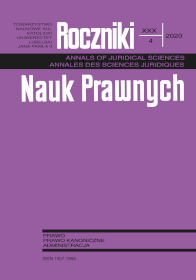Klauzula norymberska siedemdziesiąt lat później
Abstrakt
W artykule analizie poddana została wyrażona w art. 7 ust. 2 EKPC, art. 15 ust. 2 MPPOiP oraz art. 49 ust. 2 KPP klauzula norymberska. W założeniu jej twórców miała ona za zadanie źródłowo uszczegółowić zakres zasady legalizmu, pełniąc przy tym funkcję swoistej „tarczy” przed potencjalnymi zarzutami naruszenia zasady nullum crimen nulla poena sine lege przez powojenne procesy karne zbrodniarzy wojennych. W artykule wykazano, iż wbrew formułowanym niekiedy twierdzeniom, nie stanowi ona jednak wyjątku od zasady lex retro non agit, lecz konstytuuje autonomiczny pod względem źródeł zakazów karnych standard wyrażany przez zasadę nullum crimen sine iure. W pracy zbadano ponadto stosowalność ogólnych zasad prawa uznanych przez społeczność międzynarodową w kontekście odpowiedzialności karnej, a także wykazano praktyczną nieoperatywność klauzuli norymberskiej. Krytycznej analizie poddano także konstrukcję klauzuli norymberskiej. Artykuł wykazuje jej merytoryczną i logiczną wadliwość. W podsumowaniu, autor sugeruje natomiast zastąpienie klauzuli norymberskiej klauzulą prawa natury.
Bibliografia
Ambos Kai: Treatise of International Criminal Law, Vol. I, Oxford: Oxford University Press 2013.
Bassiouni Cherif M.: Crimes Against Humanity in International Criminal Law, Hague–London– Boston: Martinus Nijhoff Publishers 1999.
Bigler Olivier: Art. 7 CEDH, [w:] Convention européenne des droits de l’homme (CEDH): commentaire des articles 1 à 18 CEDH, red. L. Gonin, O. Bigler, Berne–Paris: Stämpfli Editions: 2018, s. 445-468.
Bleichrodt Edwin: No Punishment without Law, [w:] Theory and Practice of the European Convention on Human Rights, red. P. van Dijk, F. van Hoof, A. van Rijn, L. Zwaak, Cambridge: Intersentia 2018, s. 381-424.
Boot Machteld: Nullum crimen sine lege and the subject matter jurisdiction of the International Criminal Court: genocide, crimes against humanity, war crimes, Antwerpia: Intersentia 2002.
Cassese Antonio: Balancing the Prosecution of Crimes against Humanity and Non-Retroactivity of Criminal Law The Kolk and Kislyiy v. Estonia Case before the ECHR, “Journal of International Criminal Justice” 2006, nr 4, s. 410-418.
Cassese Antonio: Cassese’s International Criminal Law, Oxford: Oxford University Press 2013.
Douglas Lawrence: The Right Wrong Man. John Demjanjuk and the Last Great Nazi War Crimes Trial, Princeton: Princeton University Press 2016.
Fletcher George: Parochial versus Universal Criminal Law, “Journal of International Criminal Justice” 3 (2005), s. 20-34.
Gallant Kenneth: The Principle of Legality in International and Comparative Criminal Law, Cambridge: Cambridge University Press 2009.
Glaser Stefan: The Charter of the Nuremberg Tribunal and New Principles, [w:] Perspectives on the Nuremberg Trial, red. G. Mettraux, Oxford: Oxford University Press 2008, s. 55-70.
Gorostiza J.-M. Landa: Art. 7, [w:] Convenio europeo de derechos humanos: comentario sistemático, red. I. Lasagabaster Herrarte, Madryt: Civitas 2015, s. 298-337.
Grzebyk Patrycja: The Role of the Polish Supreme National Tribunal in the Development of Principles of International Criminal Law, [w:] Historical Origins of International Criminal Law, Vol. 2, red. M. Bergsmo, C. Wui Ling, Y. Ping, Bruksela: FICHL Publication Series 2014, s. 603-630.
Hofmański Piotr: Art. 7, [w:] Konwencja o Ochronie Praw Człowieka i Podstawowych Wolności, red. L. Garlicki, A. Wróbel, Warszawa: C.H. Beck 2010, pkt 7-8.
Indecki Krzysztof: Zasada nullum crimen sine lege w prawie karnym międzynarodowym, [w:] Księga jubileuszowa ofiarowana Pani Profesor Genowefie Rejman z okazji osiemdziesiątych urodzin, red. L. Gardocki, M. Królikowski, A. Walczak-Żochowska, Warszawa: Wydawnictwo Liber 2005, s. 147-152.
Jain Neha: Judicial Lawmaking and General Principles of Law in International Criminal Law, “Harvard International Law Journal” 57 (2016), nr 1, s. 111-150.
Karski Karol: Zasada lex retro non agit a międzynarodowe prawo karne: kilka refleksji na tle genezy pojęcia, [w:] Międzynarodowe i europejskie prawo karne – osiągnięcia, kierunki rozwoju, wyzwania, red. J. Nowakowska-Małusecka, I. Topa, Katowice: Wydawnictwo Uniwersytetu Śląskiego 2015, s. 45-61.
Mariniello Triestino: The ‘Nuremberg Clause’ and Beyond: Legality Principle and Sources of International Criminal Law in the European Court’s Jurisprudences, “Nordic Journal of International Law” 82 (2013), s. 221-248.
Martinez Manuel Galvis: The Historical Evolution of Allegiance During Occupation, “American Journal of Legal History” 2020, s. 1-25.
Masternak-Kubiak Małgorzata: Przestrzeganie prawa międzynarodowego w świetle Konstytucji Rzeczypospolitej Polskiej, Kraków: Zakamycze 2003.
Mitsilegas Valsamis: Article 49 Principles of Legality and Proportionality of Criminal Offences and Penalties, [w:] The EU Charter of Fundamental Rights. A Commentary, red. S. Peers, T. Hervey, J. Kenner, A. Ward, Oxford: Hart Publishing 2014, s. 1351-1371.
Pavarani Cristina: Nessuna pena senza legge, [w:] La Convenzione europea dei diritti dell’uomo e delle libertà fondamentali. Commentata ed annotata, red. C. Defilippi, D. Bosi, R. Harvey, Roma–Napoli: Edizioni scientifiche italiane 2006, s. 259-268.
Pellet Alain: Article 38, [w:] The Statute of the International Court of Justice: a commentary, red. A. Zimmermann et al., Oxford: Oxford University Press 2012, s. 731-869.
Safferling Christoph: Internationales Strafrecht. Strafanwendungsrecht: Völkerstrafrecht: Europäisches Strafrecht, Berlin–Heidelberg: Springer 2011.
Salvia de Michel: Compendium de la CEDH: les principes directeurs de la jurisprudence relative à la Convention européenne des droits de l’homme, Strasbourg: Editions N.P. Engel 2003.
Shklar Judith N.: Legalism: Law, Morals, and Political Trials, Cambridge: Harvard University Press 1964.
Sobczak Witold: Zasada nieretroaktywności w prawie karnym, [w:] Międzynarodowy Pakt Praw Obywatelskich (Osobistych) i Politycznych, red. R. Wieruszewski et al., Warszawa: C.H. Beck 2012, s. 339-357.
Schabas William A.: The European Convention on Human Rights: A Commentary, Oxford: Oxford University Press 2015.
Szczucki Krzysztof: Dostępność moralna czy językowa? Rzecz o wykładni prokonstytucyjnej prawa karnego, [w:] Nullum crimen sine lege, red. I. Sepioło, Warszawa: C.H. Beck 2012, s. 43-56.
Szwarc-Kuczer Monika: Art. 49, [w:] Karta Praw Podstawowych Unii Europejskiej: komentarz, red. A. Wróbel, Warszawa: C.H. Beck 2013.
Timmerman Mikhel: Legality in Europe. On the principle nullum crimen, nulla poena sine lege in EU law and under the ECHR, Cambridge: Intersentia 2018.
Van Schaack Beth: Crimen Sine Lege: Judicial Lawmaking at the Intersection of Law and Morals, “The Georgetown Law Journal” 97 (2008), nr 119, s. 119-192.
Weinschenk Fritz: Nazis Before German Courts: The West German War Crimes Trials, “International Lawyer” 10 (1976), nr 3, s. 515-529.
Wołodkiewicz Witold: „Lex retro non agit”: sformułowanie w polskiej doktrynie prawniczej, „Zeszyty Prawnicze” 1 (2001), s. 103-122.
Copyright (c) 2020 Roczniki Nauk Prawnych

Utwór dostępny jest na licencji Creative Commons Uznanie autorstwa – Użycie niekomercyjne – Bez utworów zależnych 4.0 Międzynarodowe.


